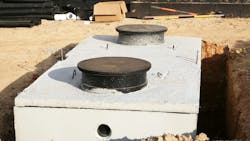Md. approves $2.5M for septic system upgrades, PFAS analysis
The Maryland Board of Public Works announced that it has approved $2.3 million in grants to upgrade eighteen counties’ on-site septic system and approved $250,000 for analysis of per- and polyfluoroalkyl substances (PFAS).
“These smart investments in upgrading septic systems will protect public health and prevent water pollution in the Chesapeake Bay and Maryland communities across the state,” says Maryland Environment Secretary Horacio Tablada. “As part of Maryland’s commitment to understand, communicate, and reduce the risk of PFAS in our state we will [also] conduct state-of-the-art PFAS sampling to identify and respond to this emerging contaminant.”
The grants, provided through the Bay Restoration Fund, will provide funding for septic system upgrades to reduce the discharge of nitrogen, which is one of the most serious pollutants in the Chesapeake Bay.
The board also approved funding for a memorandum of understanding between the Maryland Department of the Environment (MDE) and the Maryland Department of Health (MDH) laboratory for the investigation of emerging per- and polyfluoroalkyl substances (PFAS) contaminants.
The memorandum of understanding between MDE and MDH will allow for faster turnaround times and decreased costs in sampling of PFAS to identify and remediate sources of the contaminants and their impacts to the environment. The board approved a $250,000 grant from MDE, using funds in the agency’s Hazardous Substance Cleanup Program, to MDH.
The MDH laboratory has purchased state-of-the-art laboratory equipment and completed a rigorous multi-lab validation process by the U.S. Environmental Protection Agency, making it more capable for PFAS analysis than any other lab in the state.
